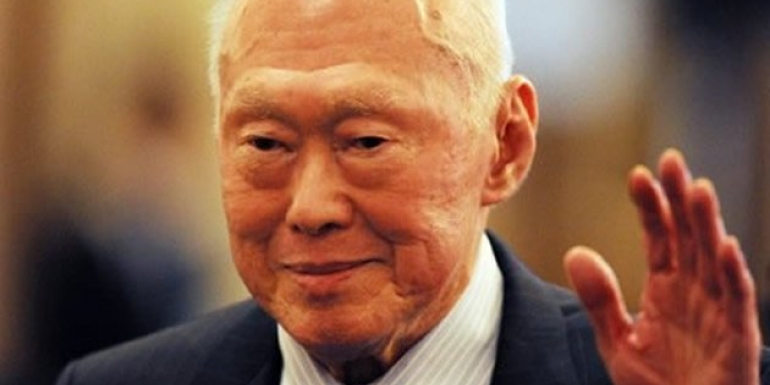It has been nearly 2 years since Singapore mourned the loss of its beloved founding father Lee Kuan Yew (died 23rd March 2015). He was a leadership giant, an authoritarian with values, who leaves a legacy of a thriving first world metropolis, where once there was just mud.
Much has been written about the life of Singapore’s first prime minister and so this post will focus specifically on his leadership through the eyes of a Westerner who has made Singapore his home for the last thirteen years. I have picked 9 leadership lessons that his life clearly demonstrated, and I humbly offer these in respect for his great contribution to my adopted country.
1. Intention
Self-leadership starts with intention and ends in impact. The physical manifestation of the impact is clear in the ‘Garden City’ with towering, shiny buildings, economic and political stability. The common rhetoric is that leadership starts with a vision, but in this case the intention to create this modern miracle grew out of discrimination and disgust.
Having grown up under first British and then Japanese rule, Lee Kuan Yew could have been conditioned to think of himself as inferior, but after the war he studied law at Cambridge University, graduating with a double starred-first-class honors in law.
Here in Singapore, you didn’t come across the white man so much. He was in a superior position. But there you are (in Britain) in a superior position meeting white men and white women in an inferior position, socially, I mean. They have to serve you and so on in the shops. And I saw no reason why they should be governing me; they’re not superior. I decided when I got back, I was going to put an end to this.”
This quote demonstrates an intention, with the self-awareness and self-confidence to achieve it. His early years formed a mind-set that lead him to be an outspoken champion of “Asian values”.
We in Malaya are now seeing British domination after over a hundred years enter its last phase. Colonial imperialism in Southeast Asia is dead except in Malaya, and our generation will see it out.”– Speech at Malayan Hall, 28 January 1950
LKY as he was often known, demonstrated a clear desire to exercises autonomy from his British masters. He also showed his ability to take responsibility when his actions did not achieve the desired results. He led a merger with Malaysia and then reversed his position to champion an independent Singapore in 1965.
When LKY first returned to Singapore after his studies in Britain, he joined the law firm Laycock & Ong, but after discovering the pro-British politics of its senior partner were out of step with his own, he founded the firm Lee & Lee with his wife, Choo, and brother Dennis.
2. Competency
A leader must be competent, and LKY’s legal training, coupled with his ability as a multi-lingual orator (English, Mandarin and Malay), gave him the ability to reach the widest audience of the nation’s multi-racial, multi-cultural citizenry.
He became legal advisor to more than 100 different unions and associations, and on 12th November 1954, he formed the ‘socialist’ People’s Action Party (PAP).
His early political career was marked by shrewd collaboration, such as the “marriage of convenience” with the pro-communist trade unionists. A partnership he saw dissolved when the time was right.
3. Influence
In the national elections held on 30 May 1959, LKY’s PAP won 43 of the 51 seats in the legislative assembly. Singapore gained self-government with autonomy in all state matters except defence and foreign affairs. Lee Kuan Yew became the first Prime Minister of Singapore on 3 June 1959,
Once in a long while in the history of a people, there comes a moment of great change. Tonight is such a moment in our lives… We begin a new chapter in the history of Singapore.”
– Victory rally at the Padang, 3 June 1959
4. Resilience
Self-government was not easy, LKY faced resistance in his move to become part of The Federation of Malaysia, and racial unrest when it was achieved on 16th September 1963.
Disgusted with race based politics that followed joining the Federation, LKY eventually, emotionally and painfully reverses his position on merger.
For me it is a moment of anguish because all my life… You see, the whole of my adult life… I have believed in merger and the unity of these two territories. You know, it’s a people, connected by geography, economics, and ties of kinship… Would you mind if we stop for a while?”
– At the historic press conference on 9 August 1965. He stopped the interview at this point to regain his composure.
5. Self-efficacy
We have confidence when we know how to do something, but self-efficacy is the belief you can overcome any obstacle.
With independence from Britain and now Malaysia, LKY and his team now faced the daunting task of ensuring the fledgling nation’s survival against overwhelming odds. With no natural resources, LKY and his economic team of Dr Goh Keng Swee, Mr Lim Kim San and Mr Hon Sui Sen embarked on an export-oriented industrialization strategy to create jobs.
Knowing he needed foreign investment he invited Multi-National Corporations (MNCs) to set up in Singapore. The various policies implemented in the immediate post-independence years resulted in massive economic and social progress for the people. By the end of the 1970s, unemployment had dropped from 10% to 3% and growth was averaging 10% per annum.
6. Collaboration
Some have suggested that LKY believed in Chinese supremacy, but if he did, he managed to create collaboration from different races and faiths.
But I say to you: here we make the model multi-racial society. This is not a country that belongs to any single community: it belongs to all of us. You helped built it; your fathers, your grandfathers helped build this… Over 100 years ago, this was a mud-flat, swamp. Today, this is a modern city. Ten years from now, this will be a metropolis. Never fear.”– Sharing his vision for Singapore at the Sree Narayana Mission on 12 September 1965.
7. Transformation
Transformational leadership requires creating an environment where people want to work hard to achieve for themselves and the group. LKY transformed Singapore both physically and culturally. He championed home ownership, education for all, national service, and a green city program to give every Singaporean a stake in the country.
We have met our people’s basic needs, we have to meet the rising aspirations of Singaporeans… Home ownership motivates Singaporeans to work hard and to aspire for a better future for their family, to upgrade to better and bigger flats. The HDB story reflects the social mobility of Singaporeans. ”
– At the launch of Tanjong Pagar Town Council’s Five-year Masterplan and opening of ABC Waters on 22 March 2011.
Today, the Singapore has one of the highest home ownership rates in the world, with 90% of Singaporeans owning their homes, the vast majority of them HDB flats.
8. Global Influence
LKY understood the vulnerability of small states such as Singapore, and believed that “a small country must seek a maximum number of friends, while maintaining the freedom to be itself as a sovereign and independent nation”.
Between 1959 and 2012, Mr Lee made at least 304 official trips to 83 countries. A world-class strategic thinker whose insights were sought by world leaders, he was instrumental in forging a place for Singapore in the international arena.
9. Succession Planning
Many leaders fail to groom their successors or hang on too long! LKY worked hard to ensure a smooth leadership transition to the next generation.
LKY handed over to Mr Goh Chok Tong on 28 November 1990, but continued to advise the government on important issues for another 21 years, first as Senior Minister under Mr Goh and then as Minister Mentor under Mr Lee Hsien Loong.
A successful legacy will be a prospering Singapore
I have spent my life, so much of it, building up this country. There’s nothing more that I need to do. At the end of the day, what have I got? A successful Singapore. What have I given up? My life.” – Lee Kuan Yew 16 September 1923 – 23 March 2015



